
Increased Risk Of Heart Disease And Heart Attack
Studies have shown that one cup of wine improves cardiac health. This may be attributed to beneficial effects of alcohol consumption in moderation. Alcohol increases high density lipoprotein levels in a dose dependent manner and reduces the serum level of inflammatory mediators when consumed in moderation. Moderate alcohol consumption also reduces the incidence of type 2 diabetes and impaired insulin sensitivity. But the risk of heart disease increases with heavy alcohol consumption. Regular heavy alcohol consumption is associated with increased levels of inflammatory markers. This is directly related to vasculitis, atherosclerosis and ischemia. Macrophages engulf lipids and become foam cells in vessel walls. They secrete inflammatory mediators which damage vessel walls. This is an essential step in atherosclerosis.
- Important notification about information and brand names used in this slideshow!
- Photo courtesy of Jeremy King by Flickr : www.flickr.com/photos/poitinjimmie/4117271628/
- Ganong's review of medical physiology
- http://circ.ahajournals.org/content/112/10/1379.full
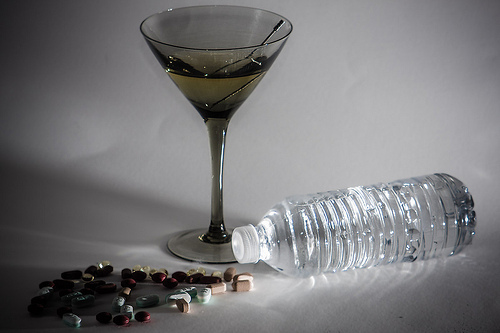
Alcohol Interferes With Medications
Alcohol is a metabolically active compound which interferes with the action of many prescription medications. The action of anesthetic drugs given for general anesthesia is inhibited and higher doses are required to induce the same effect. Alcohol reduces the efficacy of antibiotics and causes gastrointestinal symptoms. Alcohol may increase the sedative effect of anti-depressants, anti-histamines, opioids, benzodiazepines, barbiturates and anti-psychotics and raise blood pressure. The hypoglycemic effect of blood sugar lowering drugs is less with alcohol. Anti-epileptics provide less protection against fits with alcohol. Alcohol also slows down the metabolism of anti-ulcer drugs, retains them in the blood stream and increases side effects.
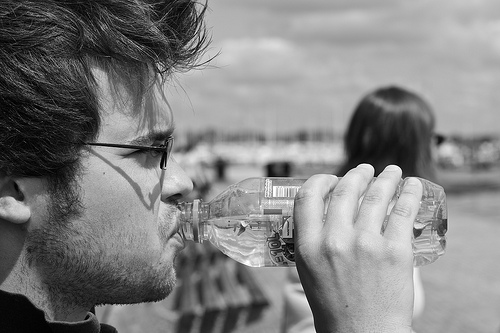
Alcohol Makes You Dehydrated
Alcohol inhibits the secretion of anti-diuretic hormone (ADH) from the posterior pituitary. ADH causes vasoconstriction and reduces the cardiac output by acting on an area of the brain called “area postrema”. Reduced cardiac output and constriction of the feeding arteries of the filtration mechanism of kidney lowers renal blood supply. Water filtration reduces. ADH increases the breakdown of glycogen in the liver, and acts on the collecting ducts of the excretory units (nephrons) of kidney and retain water. ADH reduces the expression of a water channel called aquaporin 2 on the luminal surface of principle cells of collecting ducts. Because alcohol inhibits ADH, a large amount of water is lost in urine.
- Important notification about information and brand names used in this slideshow!
- Photo courtesy of BMiz by Flickr : www.flickr.com/photos/benmizen/8911280769/
- Ganong's review of medical physiology

Alcohol Can Cause 7 Types Of Cancer
Did you know that 3.6% of all malignancies and 3% of all deaths related to cancer are said to be due to alcohol consumption? Alcohol is associated with colorectal, stomach, liver, ovarian, breast, oral, esophageal, pharynx and larynx cancers. Alcohol is metabolized into acetaldehyde. This is broken down with aldehyde dehydrogenase in liver. When there is a defect in aldehyde dehydrogenase, acetaldehyde accumulates in the body. High acetaldehyde levels are associated with cancers in the liver and upper part of the gastrointestinal tract. Alcohol induces cytochrome P 2E1 (an enzyme complex in liver). It increases the production of free radicals and converts procarcinogens (early supportive factors of cancers) to carcinogens. All these effects lead to malignant disorders.
- Important notification about information and brand names used in this slideshow!
- Photo courtesy of Erich Ferdinand by Flickr : www.flickr.com/photos/erix/3444669545/
- General pathology by Walter and Israel

Alcohol Is More Dangerous For Women
Studies have shown that blood levels of alcohol in women are higher than in men after drinking equal amounts. Alcohol induced liver failure occurs earlier in females than in males. The incidence of alcohol induced cardiomyopathy is similar in both males and females despite lower alcohol consumption in females. Heavy alcohol consumption is associated with breast and ovarian cancers. Alcohol consumption during pregnancy can cause alcoholic embyopathy — a set of congenital abnormalities that can affect the growth, development and life expectancy of the baby. Statistics suggest that even with a comparatively low number of female drivers, the incidence of alcohol related traffic accidents are higher among females.
- Important notification about information and brand names used in this slideshow!
- Photo courtesy of A.Currell by Flickr : www.flickr.com/photos/23748404@N00/787020838/
- Gynecology by ten teachers
- Obstetrics by ten teachers

Increases Blood Pressure
Alcohol intake exerts some physiological changes on the body. This is the reason for withdrawal symptoms. Blood pressure recordings are high during chronic alcohol users' withdrawal periods due to the excitatory effect on the central nervous system and release of cortisol. Adrenalin and noradrenalin secretion is high during alcohol consumption. Adrenalin and noradrenalin increase the heart rate, constrict blood vessels and increase cardiac contractility. All these effects contribute towards raising blood pressure. Chronic alcohol intake alters the vascular response to circulating catecholamines resulting in elevation of systemic blood pressure. It is also theorized that with chronic alcohol intake angiotensin and other vasoactive substances may play a role in elevating blood pressure.

Alcohol Thins Blood
Studies have shown that low dose alcohol consumption is associated with a reduced clotting ability of blood. The international normalized ratio (a measurement of clotting) increases with low dose alcohol consumption in patients on warfarin. According to scientists at Georgetown University alcohol consumption reduces aggregation of platelets. When a vessel is damaged, triggering factors in cells lining the damaged vessel become exposed. This activates circulating platelets. Platelets release chemical mediators that trigger the clotting cascade and clump together to form a platelet plug to temporarily close the defect. This effect is less in alcohol consumption. The reduction in clotting ability is greater in females than in males.
- Important notification about information and brand names used in this slideshow!
- Photo courtesy of espensorvik by Flickr : www.flickr.com/photos/28478778@N05/5729020694/
- onlinelibrary.wiley.com/doi/10.1592/phco.25.2.303.56955/abstract
- Ganong's review of medical physiology

Alcohol Affects Your Brain, Memory, And Behaviour
Alcohol exposure damages the brain even in utero. Children of mothers who consumed alcohol during pregnancy may have structural abnormalities in the cerebellum, hippocampus, basal ganglia and corpus callosum. These children have cognitive defects, poor learning abilities and a low IQ. Alcohol inhibits ADH secretion, and ADH increases glycogen breakdown in the liver. A lack of ADH reduces glycogen breakdown and blood glucose levels. Acetylcholine synthesis in nerves requires glucose. A low glucose supply limits acetylcholine synthesis in brain nerve cells. Chronic alcohol consumption causes long-term low glucose levels, leading to low neural cholinergic activity. Studies have shown that the memory is associated with cholinergic activity, so alcohol causes memory loss.
- Important notification about information and brand names used in this slideshow!
- Photo courtesy of Imagens Evangélicas by Flickr : www.flickr.com/photos/imagensevangelicas/6339939867/
- pubs.niaaa.nih.gov/publications/arh25-3/185-191.htm
- Ganong's review of medical physiology

Suppresses The Immune System
When a fetus is exposed to alcohol, it becomes susceptible to bacterial infections after birth. Alcohol causes defects in B and T lymphocytes, natural killer cells, macrophages and monocytes. These are effector cells of the human immune system. Immunglobulin levels are high in alcoholics but their effectiveness is less. Alcoholics with alcoholic cirrhosis have significantly lower levels of lymphocytes. Alcohol interferes with normal interactions between T and B lymphocytes leading to uncoordinated ineffective immune responses. Alcohol causes bone marrow suppression with chronic consumption leading to a reduction in all cell lines; namely, red blood cells, white blood cells and platelets. Cytokines are synthesized by effector cells in response to a foreign antigen. Cytokine balance is affected in alcoholics.
- Important notification about information and brand names used in this slideshow!
- Photo courtesy of Mario Antonio Pena Zapatería by Flickr : www.flickr.com/photos/oneras/3449142109/
- www.nature.com/pr/journal/v15/n6/abs/pr19812093a.html
- http://alcalc.oxfordjournals.org/content/34/6/830.short

Gout
Gout patients who consume alcohol get acute flare ups at lower plasma levels of urate than those who do not consume alcohol. Acute high alcohol consumption increases plasma urate levels. Alcohol inhibits ADH secretion. This lowers glycogen breakdown in the liver. Less glucose is delivered to cells and fat is broken down. Intracellular acetate levels rise leading to ketone body formation. These ketone bodies inhibit urate excretion in the kidneys. Alcohol also increases the synthesis of uric acid due to increased adenine metabolism.
- Important notification about information and brand names used in this slideshow!
- Photo courtesy of David Blackwell. by Flickr : www.flickr.com/photos/mobilestreetlife/5865909539/
- rheumatology.oxfordjournals.org/content/43/10/1208.full
- http://www.ncbi.nlm.nih.gov/pmc/articles/PMC1836465/?page=1








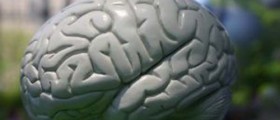
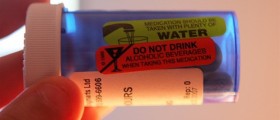

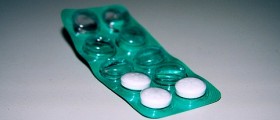



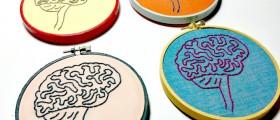











Your thoughts on this
Loading...